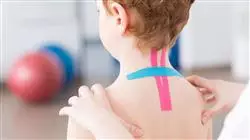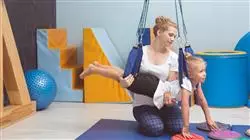University certificate
The world's largest faculty of physiotherapy”
Introduction to the Program
A comprehensive and practical Postgraduate diploma that will allow you to learn everything you need to work as a physiotherapist in early care in a realistic and direct way”

Child physiotherapists are in charge of advising, treating and caring for infants and adolescents who either suffer from or are at risk of general developmental delay and congenital or acquired movement disorders. As such, they carry out general assessments of children and their environment to establish the objectives that will help them successfully complete treatment. They are also responsible for establishing the therapeutic intervention that best suits each child's situation.
To accomplish this, professionals utilize a series of tools and techniques such as movements, exercises, breathing control, strength-building exercises, postural aids, among others, but the main techniques that will always be used are games and stimulation of movement learning. This Postgraduate Diploma provides specific and advanced knowledge of Physiotherapy in Early Care.
Throughout these months, students will acquire the knowledge required to work in Early Childhood Care, taking a deeper look into normal and pathological development in children, child pathology, assessment and treatment
Likewise, this Postgraduate diploma seeks to guide physiotherapists through the functions that are carried out in Early Care, as well as to provide them with therapeutic tools and essential knowledge that is useful for professional work.
The teaching staff have extensive experience and training, both on a national and international scale, in the field of child physiotherapy, which positions this Postgraduate diploma above others in the market, so graduates will have an excellent reference. Both the course director and the professors will put their knowledge and professional experience at students’ disposal in a practical manner. Therefore, this course will swiftly provide you with knowledge on all aspects related to Physiotherapy in Early Care.
A 100% online Postgraduate diploma that provides students with the opportunity to study comfortably, wherever and whenever suits them best. All you need is a device with Internet access to take your career one step further. A modality in keeping with the current times and with all the guarantees to establish professionals in a highly demanded field.
A unique opportunity to specialize and stand out in a highly in-demand sector for professionals”
This Postgraduate diploma in Physiotherapy in Early Care offers professionals the advantages of a high-level scientific, teaching, and technological program. These are some of its most notable features:
- The latest technology in online teaching software
- A highly visual teaching system, supported by graphic and schematic contents that are easy to assimilate and understand
- Practical cases presented by practicing experts
- State-of-the-art interactive video systems
- Teaching supported by telepractice
- Continuous updating and recycling systems
- Autonomous learning: full compatibility with other occupations
- Practical exercises for self-evaluation and learning verification
- Support groups and educational synergies: questions to the expert, debate and knowledge forums
- Communication with the teacher and individual reflection work
- Content that is accessible from any fixed or portable device with an Internet connection
- Supplementary documentation databases are permanently available, even after the program
Cutting-edge education created to propel you toward greater competitiveness in the job market”
The program’s teaching staff includes professionals from the sector who contribute their work experience to this program, as well as renowned specialists from leading societies and prestigious universities.
The multimedia content, developed with the latest educational technology, will provide the professional with situated and contextual learning, i.e., a simulated environment that will provide immersive training programmed to train in real situations.
This program is designed around Problem-Based Learning, whereby the professional must try to solve the different professional practice situations that arise during the academic year. For this purpose, the professional will be assisted by an innovative interactive video system created by renowned and experienced experts.
A comprehensive program created for physiotherapy professionals, which will allow you to balance your studies with other professional responsibilities and access the course from any location with total flexibility"

Its methodological design provides students with complementary document banks to supplement the lessons"
Why study at TECH?
TECH is the world’s largest online university. With an impressive catalog of more than 14,000 university programs available in 11 languages, it is positioned as a leader in employability, with a 99% job placement rate. In addition, it relies on an enormous faculty of more than 6,000 professors of the highest international renown.

Study at the world's largest online university and guarantee your professional success. The future starts at TECH”
The world’s best online university according to FORBES
The prestigious Forbes magazine, specialized in business and finance, has highlighted TECH as “the world's best online university” This is what they have recently stated in an article in their digital edition in which they echo the success story of this institution, “thanks to the academic offer it provides, the selection of its teaching staff, and an innovative learning method aimed at educating the professionals of the future”
A revolutionary study method, a cutting-edge faculty and a practical focus: the key to TECH's success.
The most complete study plans on the university scene
TECH offers the most complete study plans on the university scene, with syllabuses that cover fundamental concepts and, at the same time, the main scientific advances in their specific scientific areas. In addition, these programs are continuously being updated to guarantee students the academic vanguard and the most in-demand professional skills. In this way, the university's qualifications provide its graduates with a significant advantage to propel their careers to success.
TECH offers the most comprehensive and intensive study plans on the current university scene.
A world-class teaching staff
TECH's teaching staff is made up of more than 6,000 professors with the highest international recognition. Professors, researchers and top executives of multinational companies, including Isaiah Covington, performance coach of the Boston Celtics; Magda Romanska, principal investigator at Harvard MetaLAB; Ignacio Wistumba, chairman of the department of translational molecular pathology at MD Anderson Cancer Center; and D.W. Pine, creative director of TIME magazine, among others.
Internationally renowned experts, specialized in different branches of Health, Technology, Communication and Business, form part of the TECH faculty.
A unique learning method
TECH is the first university to use Relearning in all its programs. It is the best online learning methodology, accredited with international teaching quality certifications, provided by prestigious educational agencies. In addition, this disruptive educational model is complemented with the “Case Method”, thereby setting up a unique online teaching strategy. Innovative teaching resources are also implemented, including detailed videos, infographics and interactive summaries.
TECH combines Relearning and the Case Method in all its university programs to guarantee excellent theoretical and practical learning, studying whenever and wherever you want.
The world's largest online university
TECH is the world’s largest online university. We are the largest educational institution, with the best and widest online educational catalog, one hundred percent online and covering the vast majority of areas of knowledge. We offer a large selection of our own degrees and accredited online undergraduate and postgraduate degrees. In total, more than 14,000 university degrees, in eleven different languages, make us the largest educational largest in the world.
TECH has the world's most extensive catalog of academic and official programs, available in more than 11 languages.
Google Premier Partner
The American technology giant has awarded TECH the Google Google Premier Partner badge. This award, which is only available to 3% of the world's companies, highlights the efficient, flexible and tailored experience that this university provides to students. The recognition as a Google Premier Partner not only accredits the maximum rigor, performance and investment in TECH's digital infrastructures, but also places this university as one of the world's leading technology companies.
Google has positioned TECH in the top 3% of the world's most important technology companies by awarding it its Google Premier Partner badge.
The official online university of the NBA
TECH is the official online university of the NBA. Thanks to our agreement with the biggest league in basketball, we offer our students exclusive university programs, as well as a wide variety of educational resources focused on the business of the league and other areas of the sports industry. Each program is made up of a uniquely designed syllabus and features exceptional guest hosts: professionals with a distinguished sports background who will offer their expertise on the most relevant topics.
TECH has been selected by the NBA, the world's top basketball league, as its official online university.
The top-rated university by its students
Students have positioned TECH as the world's top-rated university on the main review websites, with a highest rating of 4.9 out of 5, obtained from more than 1,000 reviews. These results consolidate TECH as the benchmark university institution at an international level, reflecting the excellence and positive impact of its educational model.” reflecting the excellence and positive impact of its educational model.”
TECH is the world’s top-rated university by its students.
Leaders in employability
TECH has managed to become the leading university in employability. 99% of its students obtain jobs in the academic field they have studied, within one year of completing any of the university's programs. A similar number achieve immediate career enhancement. All this thanks to a study methodology that bases its effectiveness on the acquisition of practical skills, which are absolutely necessary for professional development.
99% of TECH graduates find a job within a year of completing their studies.
Postgraduate Diploma in Physiotherapy in Early Care Care
.
TECH Global University is pleased to present the Postgraduate Diploma in Physiotherapy in Early Care, designed to provide you with the necessary tools to work in the detection and treatment of developmental disorders in children from an early age. Through our online classes, you will be able to access a quality specialization without geographical limitations, allowing you to advance your career from anywhere and at any time. Our Postgraduate Diploma in Physiotherapy in Early Care Care focuses on the most relevant and up-to-date content in the field of pediatric physical therapy. You will learn to evaluate and treat conditions such as cerebral palsy, neuromuscular disorders and congenital malformations, using specific techniques and therapies tailored to each child's individual needs. In addition, we will train you in the application of early interventions that promote the motor and functional development of young patients.
The course is designed to provide you with the knowledge and skills you will need to develop your child's motor and functional development.
Develop children's potential from the first steps
.
TECH Global University's online classes offer numerous benefits for your learning. You'll be able to access interactive multimedia content, participate in live sessions with pediatric physical therapy experts and collaborate with other professionals from around the world. The flexibility of our program will allow you to organize your studies according to your personal and professional responsibilities, ensuring an appropriate balance. We also have a faculty of renowned pediatric physical therapy specialists who will provide you with a quality education and guide you in your professional growth. In addition, you will have access to exclusive resources and a network of contacts that will allow you to establish lasting relationships with colleagues and experts in the field of early care. Enroll in the Postgraduate Diploma in Physiotherapy in Early Care Care program and gain the skills and knowledge you need to provide quality, comprehensive care for the very youngest children. Start your journey to a rewarding and opportunity-filled career today!







